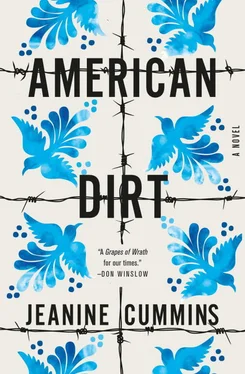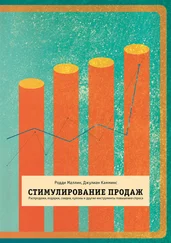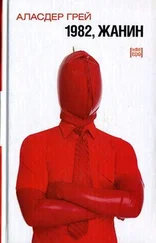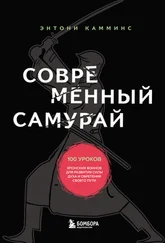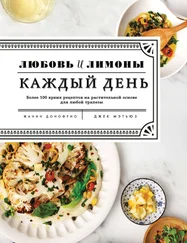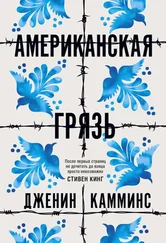Beside her, Luca presses his head against her arm. ‘Mami, I’m scared.’
‘I know, amorcito .’
‘Where did they take Rebeca?’
‘I don’t know, amorcito .’
She curls her head over his because it’s all the comfort she can give him. She tries not to think about what Soledad and Rebeca are enduring right now. Her body shudders in an effort to sling her imagination shut. Sweat trickles down her spine, and the hot air in the van feels damp and close. The reek of fear is thick. But when Luca slips his little hand up beneath her hair and clutches the nape of her neck, the sensation of his slick palm against her skin is like a shot of determination. They will survive this. They must. She curves her whole body toward him in the dark.
When finally the van doors open, the light is painful after all the blackness. The migrants feel sweaty and dizzy and thirsty. Luca’s pants haven’t dried because it was so humid inside the van. The stale urine has a piquant odor, but no one mentions it. Maybe not all of it is coming from Luca. The migrants scoot on their butts toward the open doors and try to hop down without falling. It’s a cement floor beneath them. Dim fluorescent lights high overhead. They’re inside a large warehouse, and the men in charge are no longer wearing uniforms. It takes a moment for these facts to land in Lydia’s consciousness. It’s not a precinct or a jail or an immigration detention center, but a dingy, anonymous warehouse. Carajo.
In one corner, there’s a utility sink with water running, and the migrants are permitted one at a time to stick their heads under the murky tap and take a drink. The water tastes of rust and hard-boiled eggs. Luca can’t reach.
‘Please, can you untie me so I can help my son?’ Lydia asks one of the guards.
He doesn’t answer her but instead lifts Luca so he can stick his mouth beneath the faucet.
‘What stinks?’ the man asks and then, realizing it’s Luca, tosses him down. ‘¡Qué cochino!’
Luca manages not to cry. He stands next to his mami . They are made to sit on the floor, and for a long time that’s all they do, lined up along a wall, listening to whatever sounds they can hear: a steady trickle of water dripping into that filthy sink, the clacking of some metal rollers nearby, the occasional furtive whisper of one migrant to another, the unafraid voices of the guards echoing from a nearby room where they’re talking and laughing. They’re smoking in there, too. Luca can smell it. The migrants don’t ask questions or complain. No one moves. Some of them pray quietly together. After what feels like hours, a door in one wall rolls up on its tracks, and all the migrants squint from the onslaught of unexpected daylight. A truck rolls in, the one with all their backpacks, the one with Rebeca and Soledad seated in the bed, facing the rear with their backs to the cab, their wrists still bound behind them. The door quickly rolls shut again.
‘Mami! They’re here,’ Luca says, and he starts to stand, but Mami tells him to sit back down again.
‘Luca, don’t look at them or talk to them yet,’ Lydia says. ‘Wait a minute. Let’s see how they are.’
Luca sits, even though he doesn’t fully understand what Mami means by ‘how they are’. They’re here! He was worried he’d never see them again. Mami leans forward in the dirty light. She asserts her face into his so Luca has no choice but to look at her.
‘Luca, these are very bad people. You understand?’
Luca hardens his lips against each other. He investigates a small tag of rubber tread that’s come loose from the sole of his shoe.
‘We have to be careful not to draw extra attention to ourselves now, okay? You have to be very quiet and still until we figure out what’s going to happen.’
Luca tugs at the rubber tag until it snaps.
‘Okay, mijo ?’
He doesn’t answer.
Lydia is amazed by the girls’ arrival. She, too, presumed they would never see one another again. When the men were finished with the sisters, they could’ve chosen to keep them or sell them or kill them, and that’s frankly what Lydia expected, insofar as she permitted herself to expect anything at all. Lydia had buried that presumption in a shallow place, an unmarked place, for the last several hours. She’d pushed it away because she didn’t have room for it. The girls do not look well.
Soledad has a black eye and a scraped cheek on the same side. Her hair is wild and full of grit. Rebeca is bleeding at the temple. Just a thin, bright red cord against her skin. Her mouth is swollen and raw. A guard pulls them by the ankles, one at a time, toward the liftgate of the truck and flings them to the floor like sacks of rice. Soledad and Rebeca don’t complain with their voices or faces or bodies. They’re both limp – all the flinch has gone out of them. The sisters land near the far end of the line of migrants, and they don’t move from where they’re placed. Rebeca closes her eyes at once. Soledad keeps hers open. She lifts her chin, leans forward, and looks down the line until she sees Luca sticking out a little from the rest of the migrants. She nods at him once.
‘Soledad,’ he says, just loudly enough for her to hear. Because he knows without knowing that the act of saying her name in that moment is the flag she needs in order to return to herself.
‘Rebeca,’ he says also. But Rebeca squeezes her eyes shut even tighter. She’s not ready. She pulls her knees up in front of her and buries her face there.
Now the five men who were in that truck with the sisters are uncarefully unloading the backpacks. They wear untucked white T-shirts over their dark blue uniform pants, and Lydia wonders if they’re real agentes who also work for the cartel, or if the uniforms and trucks are just elaborate costumes and props. Qué importa. They stand in the bed and toss everything down in a heap. Luca can feel the whole line of migrants clicking to attention, their spines snapping them upright. A fizz of nervousness in the air. A few more men from the office come to join them, and soon the one in charge stands before them. The others call him comandante .
‘Is anyone here a Mexican citizen?’ he asks.
‘I am,’ Lydia says. Three or four other voices join hers.
El comandante steps up to the first man, seated directly beside Rebeca. El comandante nudges the migrant’s worn shoe with the toe of his boot. ‘You’re Mexican?’
‘Yes, sir.’
‘You’re not lying to me?’
‘No, sir.’
‘You wouldn’t lie to me?’
‘No, sir.’
‘Where are you from?’
‘From Oaxaca.’
‘City?’
The man nods.
‘In what state is the city of Oaxaca?’ el comandante asks.
The man hesitates. ‘Oaxaca state?’ He is unsure.
‘Yes, amigo . The city of Oaxaca is in the state of Oaxaca. Congratulations. You must have done very well in school, in Oaxaca.’
The migrant squirms where he sits.
‘And tell me,’ el comandante continues. ‘Who is the governor of Oaxaca now?’
‘The governor?’
‘Yes, the governor. Of the state of Oaxaca. Where you are from.’
Another hesitation. ‘We, uh. We had elections recently. The governor, the last governor, he was um…’ The man shakes his head.
‘Surely you know the governor’s name?’ el comandante says.
‘Esperanza?’
El comandante turns to a guard standing behind him, who’s googling Oaxaca on his phone. He shakes his head. ‘Governor of Oaxaca is Hinojosa.’
El comandante returns his attention to the migrant. ‘Now. Would you like to tell me again where it is you’re from?’
Читать дальше
